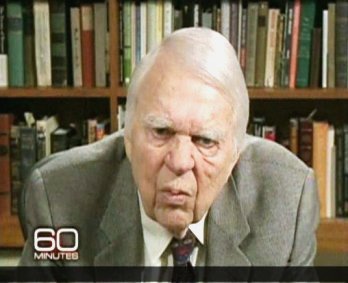Most Sunday evenings, I tune in to watch 60 Minutes. The stories are relevant, fascinating and always newsworthy.
Near the end of each show, one of a company of reporters would come out of commercial break and introduce the final member of the team with these familiar words, “…and now, a few minutes with Andy Rooney.” Thus, would begin a witty little essay by a short man with white hair sitting at a rough-cut slab of wood for a desk.

Before Jerry Seinfeld commented on the mundane aspects of our lives, there was Andy Rooney. Already a veteran WWII reporter and newspaperman when he was hired as a writer for the Arthur Godfrey radio show, Rooney more than proved his value as both a writer and a personality when he appeared in several specials for CBS in the 70s: Mr. Rooney Goes to Washington (1975), Mr. Rooney Goes to Dinner (1976), andMr. Rooney Goes to Work (1977).
However, it wasn’t until 1978, at the ripe age of 59, that Rooney presented what would grow to become more than 1,096 televised essays on all manner of common as well as uncommon subjects. This Sunday will mark Rooney’s 1,097 and final essay.
From the absurd to the ridiculous to the profound, Rooney had a way getting to the heart of the matter in under 3 minutes. Anyone with ambitions of writing could learn a lot from Rooney’s style: clear, concise, funny, and/or touching.
On the unending list of credits at the end of movies: “There are too many of them. They take too long. Who cares, anyway? Things were better when he was a kid, without all those names wasting everybody’s time.”
On a recent wave of brightly colored, pop-art scattered about major cities, Rooney said, “There are a lot of know-nothing boobs who don’t appreciate the modern art being put up in public places in all our cities. I know this is true, because I’m one of those know-nothing boobs.”
Of course, in the Rooney universe, things were always better when he was younger. “When I was a kid, my mother bought a box of cornflakes like this for about 15 cents. Now a box costs more than $4, and for fewer flakes too, probably.”
In one classic segment, he pats billionaire Bill Gates on the back for being a great philanthropist, then turns around and complains about how Gates made computers far more complicated then they needed to be. (Actually, Andy, Gates made the software that makes computers easier to use.)
One of my favorite segments came when he appeared on “Da Ali G Show” in 2004. Rooney is clearly put off by the ridiculous questions and poor grammar of comedian Sacha Baron Cohen, at one point mentioning, “I have 50 books on the English language, if you’d like to borrow one.”
One of his most poignant efforts came at the end of a 2009 broadcast in which he reflects on the tragedy of 9/11.
“There have been a lot of memorable days in our country’s history but some of them we’d rather forget. September 11th, 2001 is one of those. It isn’t a day to celebrate but it’s a day we shouldn’t forget, either.
“We need some word other than ‘holiday’ to call some of our memorable days.
“Pearl Harbor, December 7th 1941 was one of the worst days in our country’s history.
“The day John F. Kennedy was assassinated was a bad day. It was the death of just one man but JFK was so very American that we all died a little when he died.
“Presidents James Garfield, William McKinley and of course Abraham Lincoln were all assassinated. If you’re the president, you must think about them every time you go out in public. I hope we’re more careful protecting our president now.
“The Wall Street stock market crash in 1929 was a different kind of disaster.
“We went into Iraq March 20th, 2003 and they won’t be closing the banks on March 20th every year to celebrate that.
“The Three Mile Island nuclear disaster in 1979 might have wiped out our civilization.
“Most of our disasters have had some natural origin – floods, too much water. Hurricanes and tornadoes, too much wind, too much rain. Droughts may be worse but not so dramatic as hurricanes because they don’t happen on one day.
“The disaster on September 11th wasn’t like any of those. It was manmade. Death by design. Some people who hated Americans set out to kill a lot of us and they succeeded.
“Americans are puzzled over why so many people in the world hate us. We seem so nice to ourselves. They do hate us though. We know that and we’re trying to protect ourselves with more weapons.
“We have to do it I suppose but it might be better if we figured out how to behave as a nation in a way that wouldn’t make so many people in the world want to kill us.”
Every week, you made us smile and think, and all in less than 3 minutes – something all of us need to do more of these days. Sundays will never be the same without you, Andy.
Comments










